“We never give up on our patients. We are proud of our mission, which is to serve the most vulnerable.”
Your donation can help Dr. Clermont and our entire staff care for more patients than ever before.

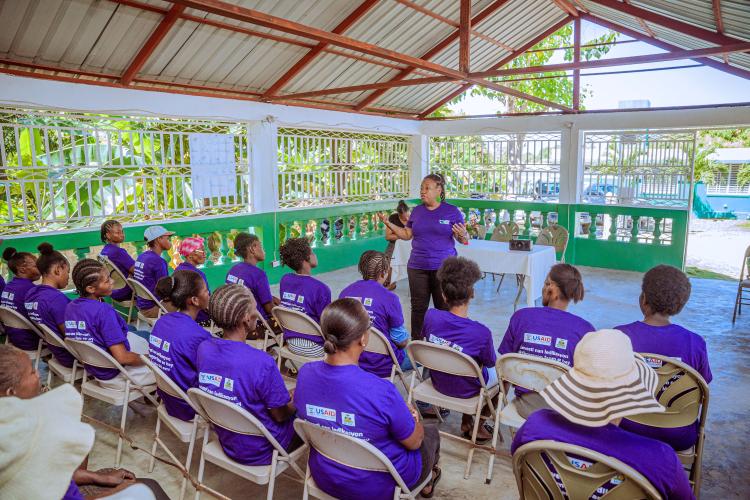
Earlier this year, the U.S. Government terminated our five-year USAID contract to strengthen Haiti’s health system, including St. Boniface Hospital. Known as the Improved Health Service Delivery (IHSD) program/Kore Sante (“Supporting Health”), this project had just reached its midpoint and was doing everything right in an extraordinarily challenging environment.
The sudden and shocking loss of funding has dangerous repercussions for our patients and for St. Boniface Hospital—the largest fully functional hospital remaining in Haiti as the ongoing humanitarian crisis pushes the entire healthcare system toward collapse.
Below, we have provided more information about what happened, the impact of the IHSD program, and how we are moving forward. But I want to be clear about one thing: we will never give up on St. Boniface Hospital or the people we serve.
On Friday, January 24th, 2025, HEI’s USAID-funded Improved Health Service Delivery (IHSD) program, known locally as Kore Sante (“Supporting Health”), was issued a “stop work” order under the U.S. government’s foreign aid freeze.
For months, we worked tirelessly to have our funding restored.
We received a humanitarian waiver, but we were still not permitted to restart the program. Day after day we were asked to submit revised proposals, new budgets, and mountains of paperwork with the promise that our funding would resume and our project could continue. But in spring, the U.S. government sent us the paperwork to close the IHSD program officially. Despite months of work and advocacy, we no longer had any hope of restoring the program or the three remaining years of critical funding we and our partners were promised.
The IHSD/Kore Sante program was a 5-year health system strengthening program HEI had been leading in southern Haiti since 2022. USAID had been running successful iterations of this program in Haiti for 45+ years.
Through this program, HEI had been helping seven nongovernmental organizations (NGOs) and 31 public and private healthcare facilities across southern Haiti improve the quality of care they provide to hundreds of thousands of patients.
This program also helped St. Boniface Hospital meet the extraordinary demand for maternal, neonatal, and child health care; comprehensive community health services; HIV/AIDS testing and treatment; and more. And, as noted above, the program helped us absorb the skyrocketing costs of medicine, supplies, fuel, and shipping: the essential resources we need to remain fully operational, 24/7.
The results we achieved in southern Haiti in just two years—despite profound difficulties from the humanitarian crisis–are remarkable:
In late 2024, USAID approved HEI to lead a countrywide expansion of the IHSD program, supporting healthcare facilities in every corner of Haiti. This opportunity was terminated along with our existing IHSD program in February 2025. Each year, IHSD-affiliated hospitals collectively deliver 20,000+ babies, vaccinate 90,000+ infants, provide ARVs to 20,000+ people living with HIV/AIDS, administer modern family planning methods to 480,000+ individuals, treat 15,000+ children for moderate or severe malnutrition, and more.
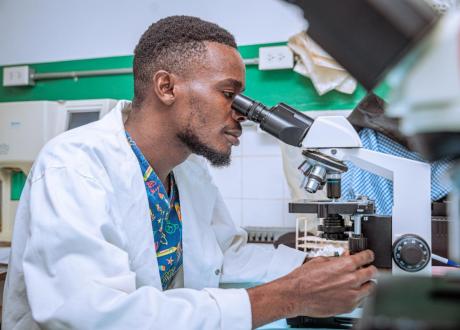
Conducting laboratory tests at an IHSD partner facility in Dame Marie, Haiti.
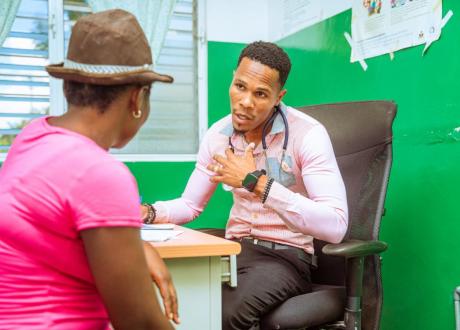
Providing quality care at an IHSD partner facility in Les Anglais, Haiti.
The IHSD program’s termination will result in significant loss of life and contribute to ongoing destabilization in Haiti. Haiti has long been mired in a health crisis, fueled by poverty, limited access to health services, and the absence of a social safety net. The IHSD program was making great strides in changing this trajectory by strengthening the infrastructure of the national public health system and reinforcing Haiti’s capacity to prevent, detect, and respond to outbreaks.
The sudden loss of USAID funding means many IHSD-affiliated hospitals will have to lay off staff and will be unable to source, purchase, and transport enough resources to meet the demand for care. We fear that ultimately, many of these healthcare facilities will be forced to close, as so many in Haiti already have. Patients will suffer as a result, since they will have even fewer places to access care during a time when hunger, disease, displacement, and violence threaten lives every day.
It is also important to note how the U.S. government’s suspension of foreign aid has further exacerbated the existing scarcity of resources at health facilities in Haiti.
For decades, the U.S. government had partnered with the Haitian Ministry of Health to distribute essential medicine and medical resources throughout the country. For example, our comprehensive HIV/AIDS program received funding through PEPFAR, the U.S. President’s Emergency Plan for AIDS Relief. In 2024, we provided 1,285 patients with lifesaving antiretroviral medications and tested 7,838 people for HIV. Our family planning clinic received contraceptives for over 3,000 clients through a partnership between the Haitian Ministry of Health and U.S. foreign assistance programs. The sudden suspension of U.S. foreign aid means healthcare facilities in Haiti—including St. Boniface Hospital—will struggle to source key resources to care for patients. And patients will be without the medicines they need to keep themselves and their families healthy.
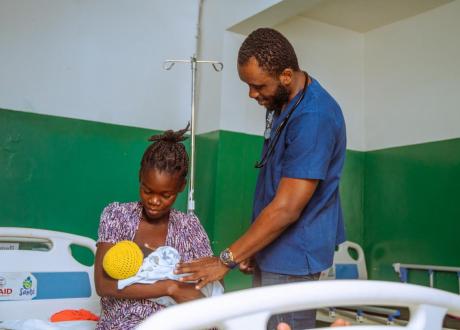
Caring for a newborn at an IHSD partner facility in Les Anglais, Haiti.
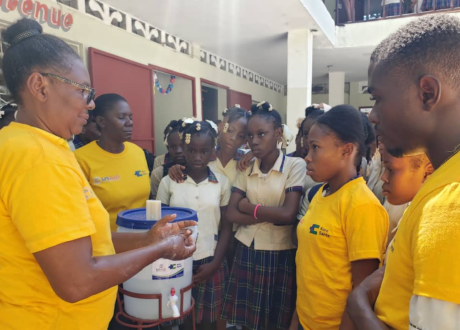
We are doing everything in our power to ensure our services remain fully operational for as long as possible. We are working with our longtime partners to continue strengthening and diversifying our funding streams as well as our supply chain. We are deeply grateful to everyone who has pledged their support and helped advocate not just for us, but for the people of Haiti.
We also take seriously the community we have built with our partners in the IHSD program. We remain committed to sharing knowledge, resources, and training opportunities wherever possible. No one hospital or organization can fix the Haitian healthcare system. All of us must continue to work together as a medical and global health community to achieve our common goal of alleviating suffering and providing the highest quality care for the people of Haiti.
Your donation can help Dr. Clermont and our entire staff care for more patients than ever before.
